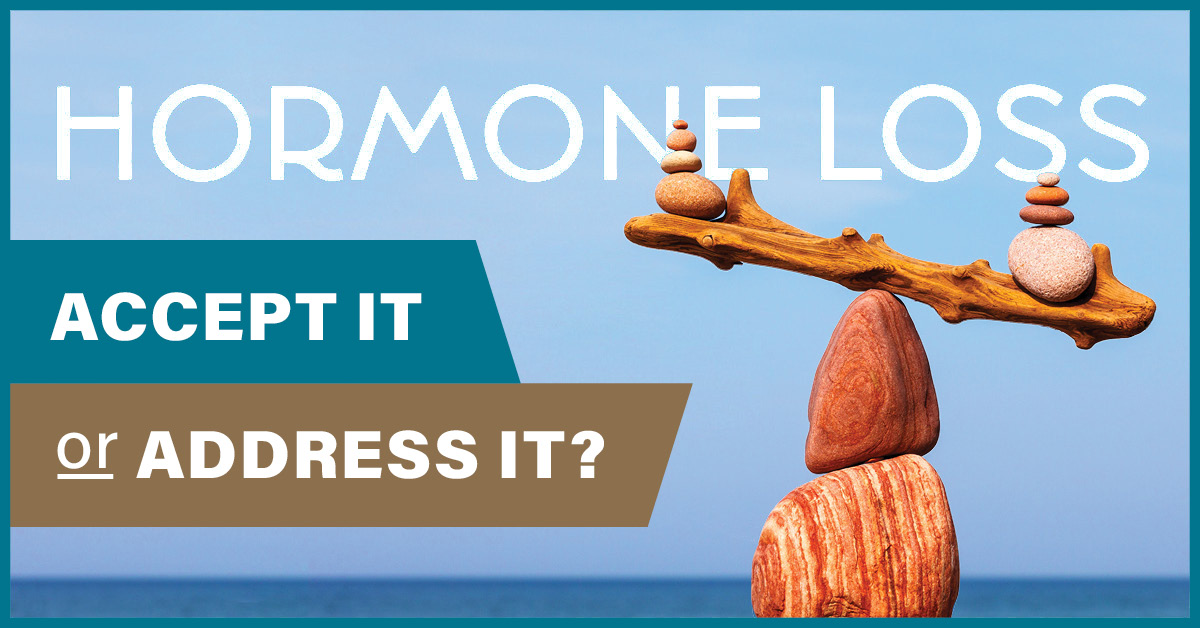
Sometimes living life to its fullest and having great quality of life includes optimizing your hormones. As we age, it is a natural progression to lose our natural levels of hormones. This varies from person to person, but typically by the age of 50 both men and women have suboptimal levels of both testosterone and estrogen.
At Evoke 5 Medical Center, my functional family medicine clinic in Oklahoma City, I see more and more men with low testosterone at an earlier age. I’m even seeing men in their 20s that have never been on any exogenous forms of testosterone with levels as low as 300 ng/dL.
Symptoms of Hormone Imbalances in Men and Women
Most men won’t ask their physician to check their hormone levels until symptoms have been ongoing for about 10 to 15 years. Typical symptoms include:
- Worsening fatigue
- Lack of motivation
- Decreased libido
- Erectile dysfunction
- Weakness
- Difficulty sleeping
Once they reach menopause, women experience similar symptoms, with the addition of hot flashes, mood swings, weight gain and brain fog.
Types of Hormone Replacement Therapy: Synthetic vs. Natural
There are many types of hormone replacement therapy that can treat symptoms and possibly even prevent other diseases from progressing. There have been many studies on hormone replacement therapy, but it is unfortunate that we continue to rely heavily on older studies that looked only at synthetic forms of hormones for replacement, or omitted data about the benefits of natural hormone replacement therapy.
In my office, we focus on more natural, or bioidentical, forms of hormone replacement therapy. These tend to have fewer side effects and less of a bypass through the liver to be metabolized. These natural/bioidentical treatments include:
- Pellet therapy
- Troche
- Bioidentical creams
Hormone Loss – Accept It or Address It?
There has been much debate around hormone replacement therapy as we age, and the actual benefits versus risks that someone may experience. Many physicians believe that as we age, it is a natural process to lose certain sex hormones, including testosterone, estrogen, progesterone. Some doctors believe we should just accept low energy, low sex drive, foggy brain function, abnormal sleep habits, decreased bone density, and weight fluctuations.
Fortunately for my patients at Evoke 5, I do not think this way. I believe that optimizing your hormone levels and mitigating abnormal symptoms can improve your quality of life – and longevity.
Benefits of Hormone Replacement Therapy
It’s been shown that there are many benefits from taking a more natural/bioidentical type of hormone. For example, testosterone has been shown to:
- Improve bone density
- Decrease blood pressure
- Decrease cholesterol
- Improve brain function
- Decrease the risk of Alzheimer’s
- Protect from prostate cancer
- Help protect from certain autoimmune disorders
Estrogen has also been shown to:
- Help with bone density
- Protect the heart
- Improve brain function
- Relieve symptoms such as hot flashes and mood swings in women
Men also need an optimal level of estrogen. Many men that have taken anabolic steroids will often have lower levels of estrogen. We have found that this most likely is the cause of cardiac disease in these men.
Risks of Hormone Replacement Therapy
Hormone replacement therapy is not without risk and should be assessed individually. Treatment should be considered on an individual basis, taking into consideration whether or not the patient would benefit.
Some individuals will have side effects from testosterone, which can include:
- Thickening of the blood (elevated hemoglobin and hematocrit)
- Acne
- Aggression (if levels are too high, but we typically see improvement of mood when optimizing testosterone levels)
- Prostate enlargement
- Water retention
- Hair loss
There can also be side effects of hormone replacement therapy for women with estrogen and progesterone. The balance of these two hormones are very important, along with monitoring throughout therapy with regular lab work. For example, women can have postmenopausal bleeding that can be induced with too much estrogen and not enough progesterone. Estrogen and progesterone can also cause breast tenderness and the feeling of engorgement. Progesterone can also cause bloating and fatigue at times. For women with any history of breast, uterine or ovarian cancer, hormone replacement therapy may not be an option.
Hormones Through the Ages
At times, I wonder if our grandparents and great-grandparents dealt with low hormone levels during their aging process. The answer to my own question is ‘I don’t think so.’ They lived in a different world at that time. A world with less pollution and more nutrients in the soil. A world with less altered food and less hormones found in food products. A world with less social pressures and anxiety.
All of these epigenetic factors can contribute to suboptimal hormone levels and should be considered when treating. Again, optimizing hormone levels later in life is really about improving quality of life.
Take a Closer Look at Hormone Levels
If you want to take a closer look at hormone levels, here are some resources to explore:
- Healthline: Bioidentical Hormone Replacement Therapy
- Mayo Clinic: Hormone Therapy – Is It Right For You?
- Biote
- Mayo Clinic: Menopause
- Healthline: Everything You Should Know About Menopause
- Cleveland Clinic: Low Testosterone (Male Hypogonadism)
- Harvard Health: Treating Low Testosterone Levels
- Healthline: 12 Signs of Low Testosterone
If you are interested in exploring if hormone replacement therapy could help you feel your best, get in touch with Dr. Cas at Evoke 5!
